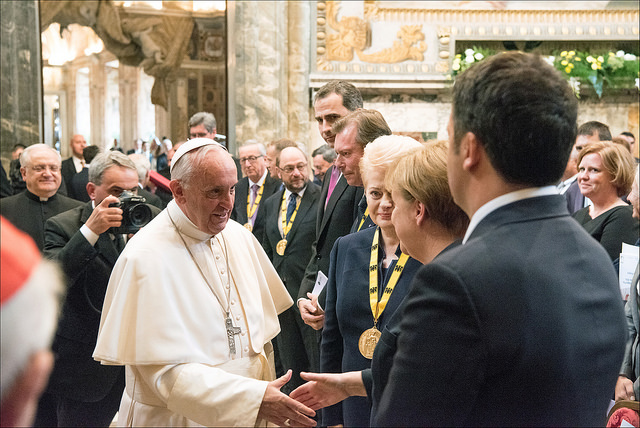Like this article? rabble is reader-supported journalism. Chip in to keep stories like these coming.
Since 1950, the German city of Aachen has awarded the Charlemagne Prize for contributions to European unity. Aachen describes itself as the “first major city in West Germany to be liberated by the Allied Forces.” It is also where Charlemagne or Charles the Great (742-814 A.D.) — the Frankish King who united much of Western Europe — is buried.
The prize was created in the turmoil of the immediate postwar period, a time of great material distress, when in Western Europe “people were looking for a new moral and spiritual direction.”
Originally conferred to highlight the need for peaceful resolutions of conflict and promote Western European unity, in 1990, following the fall of the Berlin Wall, the scope of the prize was enlarged to include the overall unification of European peoples.
On May 6, 2016 the prize was awarded to Pope Francis. It was special because the current Pope does not normally accept prizes; the ceremony took place at the Vatican, not in Aachen; and the prize recognized a speech the Pope made to the European parliament in 2014.
When the Charlemagne Prize was created, Great Britain had just broken off customs union talks with France, and the future of European co-operation was uncertain. Today, Europe awaits the result of the “Brexit” referendum on continued British participation in the European Union.
When the prize was established, the United Nations High Commission for Refugees was establishing camps in West Germany for Displaced Persons, often slave labourers under the Nazis, unwilling or unable to return home to Eastern Europe. Some 143 camps operated until the early 1960s, giving refugees to over 50,000 people.
Today Germany is home to over one million refugees.
In November 2014, the Pope urged the European parliament to unite in support of migration: “We cannot allow the Mediterranean to become a vast cemetery!”
Less than two years later, when the Pope addressed the notables of Europe gathered for the prize ceremony in the Sala Regia in the Vatican, it was noteworthy that Hungary, Austria, Macedonia, Slovenia, Croatia and Bulgaria had closed their borders to refugees.
“What has happened to you, the Europe of humanism, the champion of human rights, democracy and freedom?” exclaimed Pope Francis in his award speech.
The Pontiff wants Europe to recognize that youth are the present, not just the future, and need opportunities and values. He exhorted his audience: how can Europe fail to offer ways for young people to develop their intelligence and capacities?
For non-Catholics, and particularly for adversaries of Catholic doctrine, feminists notably, seeing the Pope winning a prize and cited favourably for leadership can lead to emotions ranging from mild discomfort to outright rage.
Yet, Pope Francis is less concerned with imposing church doctrine than he is with waking up people to the dangers and possibilities of our times. He wants to build coalitions across society, “coalitions capable of defending people from being exploited for improper ends.” Many social activists can identify with that goal.
The Pope offers ideals seldom put into practice, even in social democratic countries, the need for “new, more inclusive and equitable economic models, aimed not at serving the few, but at benefiting ordinary people and society as a whole.”
Breaking with the language of technological change favoured by economists to explain rising inequalities, Pope Francis sees just distribution of the fruits of labour and of wealth as a “moral obligation.”
Using approvingly the “liquid modernity language” of Zygmunt Bauman, the 90-year-old British sociologist, the Pope called for a move away “from a liquid economy prepared to use corruption as a means of obtaining profits to a social economy that guarantees access to land and lodging through labour.”
In making themes from the social teaching of the Catholic Church central to economics, calling for a preferential option for the poor, and identifying the priority rights of labour over capital, Pope Francis aligns himself not just with Bauman and other critics of a neoliberal world, but with a European humanist concern for the dignity of the person that needs to be revisited, reconstructed and lived.
Drawing upon Evangelii Gaudium, his major theological statement, the Pope identifies dialogue as the form of encounter needed to produce a culture capable of including all members of society.
At a time of moral disorder in Europe, the papal message addressed to the faithful offered a lesson on inclusion to all the peoples of the earth.
The Charlemagne award ceremony was a call to Europe to recognize its true self, as did founders of European unity in the postwar period, and to continue to build its house, the “home of poets, philosophers, artists, musicians, and men and women of letters.”
Duncan Cameron is former president of rabble.ca and writes a weekly column on politics and current affairs.
Photo: European Parliament/flickr
Like this article? rabble is reader-supported journalism. Chip in to keep stories like these coming.



